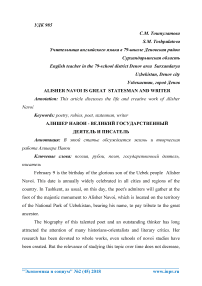Alisher Navoi is great statesman and writer
Автор: Toshpulatova S.M.
Журнал: Экономика и социум @ekonomika-socium
Статья в выпуске: 2 (45), 2018 года.
Бесплатный доступ
This article discusses the life and creative work of Alisher Navoi
Poetry, rubies, poet, statesman, writer
Короткий адрес: https://sciup.org/140236260
IDR: 140236260
Текст научной статьи Alisher Navoi is great statesman and writer
February 9 is the birthday of the glorious son of the Uzbek people Alisher Navoi. This date is annually widely celebrated in all cities and regions of the country. In Tashkent, as usual, on this day, the poet's admirers will gather at the foot of the majestic monument to Alisher Navoi, which is located on the territory of the National Park of Uzbekistan, bearing his name, to pay tribute to the great ancestor.
The biography of this talented poet and an outstanding thinker has long attracted the attention of many historians-orientalists and literary critics. Her research has been devoted to whole works, even schools of novoi studies have been created. But the relevance of studying this topic over time does not decrease, since every work of Navoi deserves analysis volumes. His poetics are extremely interesting and diverse in techniques, and views are unusually progressive.
Born in 1441 in Herat, one of the main cultural centers of the East of that time, and from childhood absorbed the beauty and sophistication of the literary language of Farsi, Alisher realized very early his mission - to become the ancestor of Uzbek literature. While studying at school, he was fond of reading poetry, especially admiring the lines of «Gulistan» and «Bustan» Saadi, as well as the poem Fariduddin Attar's «Lison ut-tayr.»
Among the schoolmates of Navoi was the future ruler of Khurasan, Hussein Baikar, who in 1469 came to power. The years of his reign have become the heyday of Uzbek literature. A great deal contributed to this Sultan himself, who was a poet, the author of interesting gazelles. Since that time, a new stage in the life of Navoi begins. He actively participates in the political life of the country. In the same year, the ruler of Khurasan appoints Navoi to the post of the keeper of the state seal (muhrdar), and in 1472 - the vizier. Being in this position, he renders great assistance to the cultural and scientific intelligentsia of the country.
In Herat and other cities, more than a hundred objects were erected by the poet for their savings, including madrassas, mosques, baths, bridges, khans, hospitals, bazaars, and many streets. The great poet and wise statesman was organically connected with the people, he lived only with his dreams and cares. In particular, he sent most of his funds to charity.
In 1487-1489, Alisher Navoi occupied the post of the head of the city of Astrabad, after which he returned to Herat. Since that time a new era in the life of the poet begins, he is more engaged in creativity. Most of his works were created precisely in this period.
In 1483-1485, Navoi wrote his greatest work – «Hamsa» (Pyateritsa), consisting of five poems – «Hayrat ul-abror» ("Confusion of the Righteous"), Farhad wa Shirin (Farhad and Shirin) , «Laili va Mazhnun», «Sabai Sayyar» («Seven Planets») and "Saddi Iskandari" ("The Wall of Iskandar"). They were created on the basis of the tradition of hamsaping - creating five (five poems). «Hamsa» Navoi was the first work in this genre, created in the Turkic language. He proved that in the Turkic language it is possible to create such a threedimensional work.
Navoi tries its strength in almost all the popular genres of Oriental literature and shows that it has its own voice, style. Alisher Navoi through his poetry raised Uzbek literature to a new, high pedestal. In 1498 he compiled a collection of all his poems called «Хazain al-Maoni» («Treasury of Thoughts»). All the poems in this collection have a volume of more than 50,000 lines.
Invaluable scientific works of Navoi are the treatises «Muhakamat-ul-Lug’atayn» in which he studies versification, linguistics, and then, on the basis of his studies, convincingly substantiates the advantages and richness of the Turkic language. Navoi created scientific works.
Thus, Alisher Navoi was the first outstanding poet who discovered the world of the colorful, unusually imaginative world of the Uzbek language, its wealth and elegance. This world was imprinted in the legacy of the poet and thinker - almost 30 poetic collections, major poems, prose, scientific treatises.
Creativity of Alisher Navoi and to this day evokes interest throughout the world, as evidenced by translations of the works of the great poet into English, French, German and many other languages. Fans of literature are attracted by the profound philosophy of his work, rich metaphors, variety of poetic images. In other words, the secret of the unfading glory of Navoi's works lies precisely in their high artistic level.
During the years of independence, Uzbekistan pays special attention to a detailed study of the poet's work, publication of his works. At the initiative of the Head of Uzbekistan, 1991 was declared the year of Alisher Navoi. The complete collection of the poet's works in twenty volumes has been published. During the past period, numerous majestic monuments to our ancestor were erected in the country and abroad. A large number of international conferences devoted to the work of Alisher Navoi both in the republic and in such countries as France, Belgium, Japan, Russia, the USA, Germany, Kazakhstan and many others have been held.
Used sources:
Список литературы Alisher Navoi is great statesman and writer
- Ismoilov M. I. TOWARDS THE ENVIRONMENTAL PARADIGM: FROM IRRATIONAL TO RATIONAL//Теория и практика современной науки. -2017. -№. 5. -С. 24-27.
- Уринбоев Х. Б., Мамажонова Г. К. САМОЦЕННОСТЬ И СМЫСЛ ЧЕЛОВЕЧЕСКОЙ ЖИЗНИ//Теория и практика современной науки. -2017. -№. 3. -С. 741-743.


